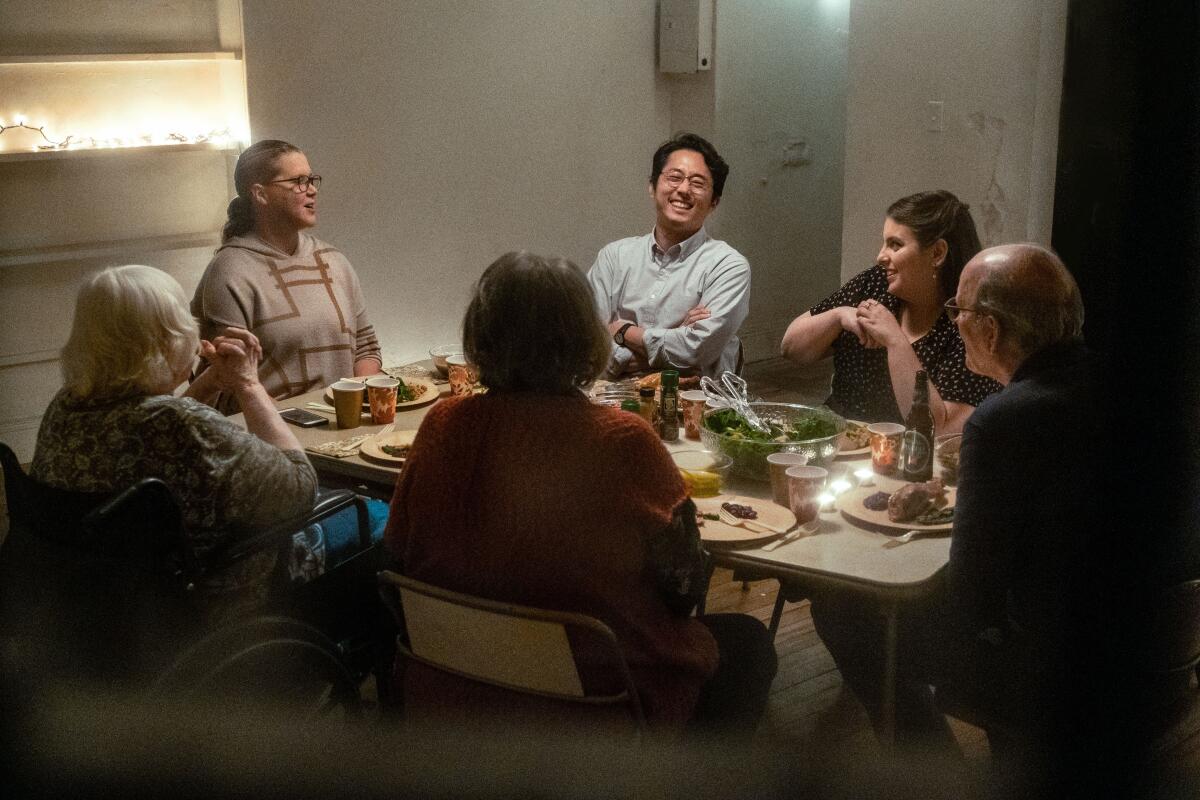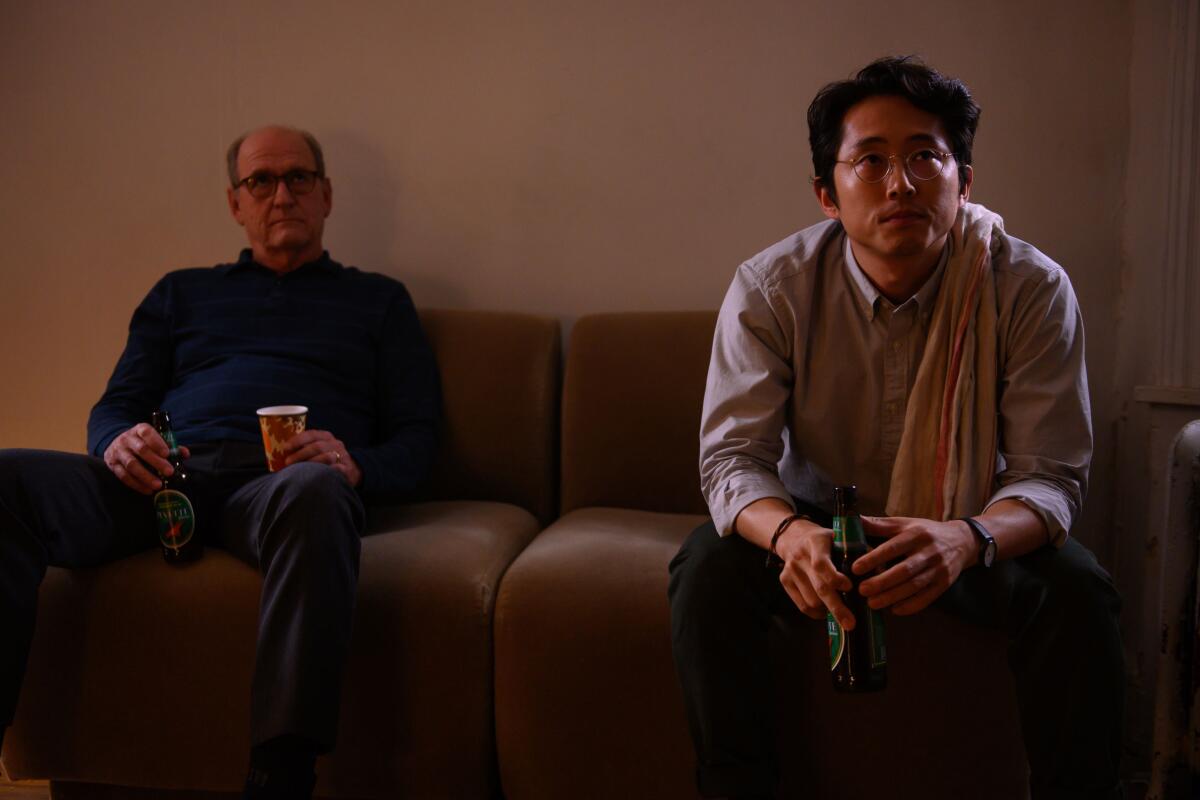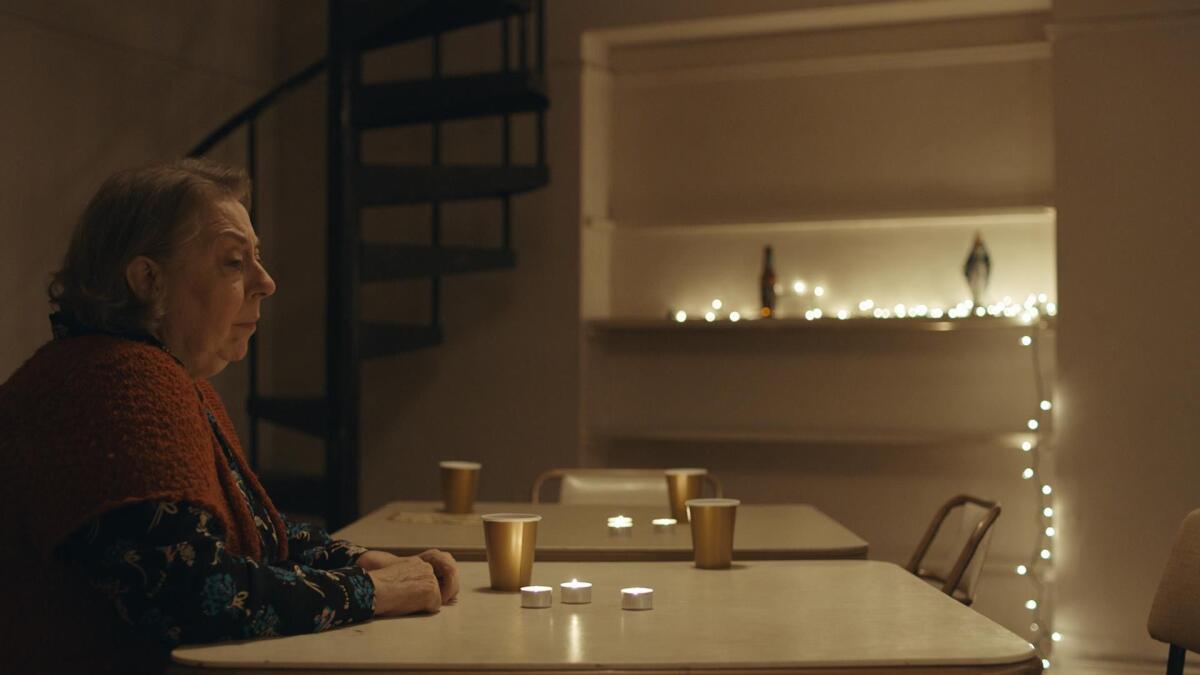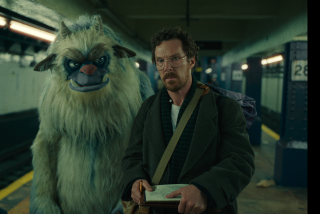Review: Spend a hell of a Thanksgiving with Amy Schumer and Steven Yeun in ‘The Humans’

The Times is committed to reviewing theatrical film releases during the COVID-19 pandemic. Because moviegoing carries risks during this time, we remind readers to follow health and safety guidelines as outlined by the Centers for Disease Control and Prevention and local health officials.
You will study your walls a little more closely after seeing “The Humans,” Stephen Karam’s intensely claustrophobic screen adaptation of his Tony-winning play. For every minute of this taut but slow-roiling family drama, we are in a dilapidated prewar apartment in Manhattan’s Chinatown, and I mean really in it. The camera, its range of movement limited within these cramped confines, magnifies stray details of David Gropman’s production design: the stains on the ceiling, the grime on the windows, the brownish drip of leaky pipes, the bumpy, whorl-like textures of paint and plaster. It’s as up-close a vision of architectural entropy as I’ve ever seen in a movie. It’s also a blunt metaphor for what nearly every character here experiences: the steady wasting away of body and spirit.
The character who perhaps feels that wasting away most acutely is Erik Blake (Richard Jenkins), the middle-aged patriarch who has gathered here with his family for Thanksgiving dinner. Ordinarily he and Deirdre (Jayne Houdyshell), his wife of many years, might be welcoming everyone to their Scranton, Pa., homestead, but this year they’re being hosted by their younger daughter, Brigid (Beanie Feldstein), at the apartment she’s just moved into with her boyfriend, Richard (Steven Yeun). Also joining the festivities are Brigid’s older sister, Aimee (Amy Schumer), and their paternal grandmother, Momo (June Squibb).
That sums up the movie’s very fine ensemble, though as you’re watching, it takes a while to sort out who’s who. Karam, working in a relentlessly naturalistic vein, doesn’t line up his characters neatly in a row (partly because there isn’t really room). Instead he drops us in, following the characters around a space that’s as unfamiliar to them as it is to us. He mines a small comedy of errors from the way Erik and Deirdre navigate Momo’s wheelchair around a narrow passageway, and he follows Aimee repeatedly up and down a spiral staircase that leads to what looks like the grottiest movie bathroom since “Parasite.” The Blakes are clearly used to taking things in stride, absorbing setbacks and indignities with the practiced resilience and salty humor endemic to their Irish-Catholic heritage.
Which is not to say that they’re above a little complaining — and who can blame them? The furniture hasn’t arrived. The light bulbs keep burning out. Loud, jarring noises interrupt the holiday chatter, some of them issuing from an upstairs apartment, some from an especially noisy trash compactor. (Skip Lievsay handled the remarkable sound design.) Blurry, inscrutable shapes hover in the euphemistically described “interior courtyard” below those tiny, grimy windows, catching Erik’s attention as he stands in the only corner of the apartment with a WiFi signal. Is “The Humans” a haunted-house movie? Maybe; Karam is not above unleashing a good jump scare or two. But for all the creeping dread he summons here through sheer formal concentration, the nature of the horror he’s addressing turns out to be much harder to pin down.

The holiday-themed dysfunctional-family melodrama has a legacy that’s both celebrated and overworked, and the strength of “The Humans” lies in the way it scrambles the formula, leaning away from the raised voices and jaw-dropping revelations that are among the genre’s more rote gestures. The Blakes aren’t especially dysfunctional; their affection for each other is palpable, and their moments of wit and groundedness serve as a natural bulwark against self-pity. But that only makes their collective malaise all the more heartbreaking in its often intensely personal and private manifestations.
Erik’s fidgety, distracted state does hint at one or two painfully guarded secrets, which he tries to cover up with warm assertions of religious faith and spirited, rascally jokes. Deirdre, steadfast in her devotion to her husband and children, is the family’s much-battered emotional glue, and the sublime Houdyshell — who won a Tony for her performance and is the lone member of the play’s original cast to make the transition to the screen — is seldom more moving than when she’s expressing gratitude for a scrap of kindness or (more often) absorbing the blow of a thoughtless, stinging remark.
Both Erik and Deirdre, who have worked the same office jobs for decades, are feeling the pinch of hard economic times and diminished opportunities. But “The Humans,” which was first performed Off-Broadway in 2015 and transferred to Broadway in 2016, is neither an overtly political piece nor a salve for white working-class pain. There are stray references to specific events: Brigid and Richard’s Chinatown apartment is located in a flood zone not far from Ground Zero, which more than once raises the grim specter of 9/11 and the family’s uniquely harrowing experience of that day. But Erik and Deirdre are most haunted by something common to parents of any generation or background, namely the fear that their children will grow up to be no more fortunate or fulfilled than they are.
Aimee, whom Schumer inhabits with wounding resignation and not a hint of her usual comic energy, has ulcerative colitis, a condition that has sideswiped her legal career; she’s also mourning the end of a long-term relationship with her girlfriend. Her sister, Brigid, played by a genially snappish, quick-witted Feldstein, may be healthier and happier in love, but her discontent — financial woes, artistic aspirations that are going nowhere — remains an unignorable thorn in her side.

For very different reasons, the grandmother and the boyfriend find themselves somewhat on the outside looking in, though both still make their presence acutely felt and their company deeply appreciated. Yeun’s Richard responds to nearly everyone with sensitivity and kindness, as well as a level of emotional vulnerability that quietly challenges Erik’s traditional masculine stoicism. (He’s also the one who unwittingly, chillingly explicates the meaning of the title.) And Squibb’s Momo, who has Alzheimer’s, gives poignant expression to the best and worst of her experience, showing us how moments of lucidity fight for dominance amid a blur of incomprehension and pain.
Momo offers each of her family members a glimpse of the fate, more existential than medical, that may well lie ahead for all of them: a state of utter aloneness, a condition that stems not from a lack of love but from the realization that love may not be enough. Erik has seen it, too; it invades his darkest dreams, some of which he has shared with his family. And it manifests itself in the walls of darkness, penetrated only by the light of an LED lamp or an open door, that sometimes flood the screen and threaten to swallow him whole.
In some ways the deep, terrifying pathos of “The Humans” emerged more organically onstage. The split-level set kept the actors in exquisite balance; the sense of tragic foreboding seemed to well up from inside the characters themselves. The sound and lighting effects felt more arresting in their impact. I’ll confess, too, to missing the particular power of Reed Birney’s performance as Erik; Jenkins, stellar as he is, doesn’t quite match his stage predecessor’s heart-crushing impact. Karam has made an impressively spare feature debut and proven himself a skilled adapter of his own material. But his access to the more demonstrative resources of cinema — a dynamic orchestral score by Nico Muhly, an ability to focus the viewer’s attention and zoom in and out at will — sometimes works against our desire to see this family and its participants whole.
At the same time, he knows how to use the fragmentation of the screen to his advantage. Initially he and his cinematographer, Lol Crawley (“Vox Lux,” “45 Years”), shoot the actors from a distance, using walls and doorways to segment the frame; Nick Houy’s sharp editing further boxes the characters into their separate spaces. But as the movie progresses, it seems to find, along with the Blakes themselves, a more cohesive rhythm and flow. The shots lengthen along with the shadows. The camera feels liberated, achieving a hard-won sense of connection as it glides around a dinner table where a family’s sadness can still give way to hope and laughter. Karam is too honest to offer closing palliatives to his characters or his audience. But when he plunges us into darkness here, as decisively as he did onstage, he does so with all the more bracing certainty that the lights will come up.
‘The Humans’
Rating: R, for some sexual material and language
Running time: 1 hour, 48 minutes
Playing: Laemmle Monica Film Center, Santa Monica; also streaming via Showtime
More to Read
Only good movies
Get the Indie Focus newsletter, Mark Olsen's weekly guide to the world of cinema.
You may occasionally receive promotional content from the Los Angeles Times.











